 EDITOR'S PICK
EDITOR'S PICK
Nuclear Alchemy: Turning Waste into Wonder Fuel
18 Aug 2025 | Synopsis
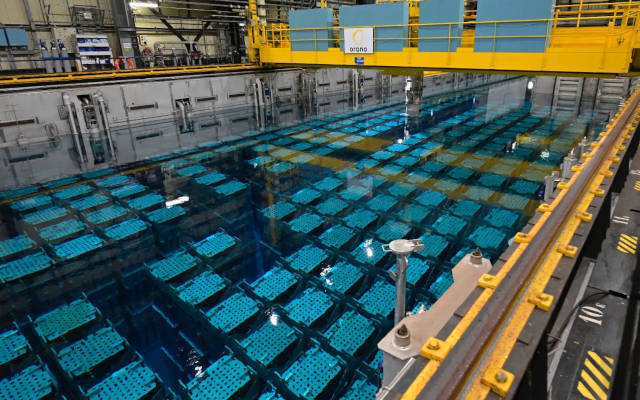 Los Alamos nuclear physicist proposes converting radioactive waste into tritium - the rare $33M/kg fusion fuel that is quickly running out. Using particle accelerators & molten lithium, the process could produce 10x more tritium than fusion reactors while solving nuclear waste crisis. However, it faces challenges: massive infrastructure needs, precise timing, & unproven at scale. It could transform a liability into a climate solution.
Los Alamos nuclear physicist proposes converting radioactive waste into tritium - the rare $33M/kg fusion fuel that is quickly running out. Using particle accelerators & molten lithium, the process could produce 10x more tritium than fusion reactors while solving nuclear waste crisis. However, it faces challenges: massive infrastructure needs, precise timing, & unproven at scale. It could transform a liability into a climate solution.Switzerland's Innovation in Travel and Tourism: Now, Arbon's Autonomous Electric Bus to Boost Tourism
18 Aug 2025 | Synopsis
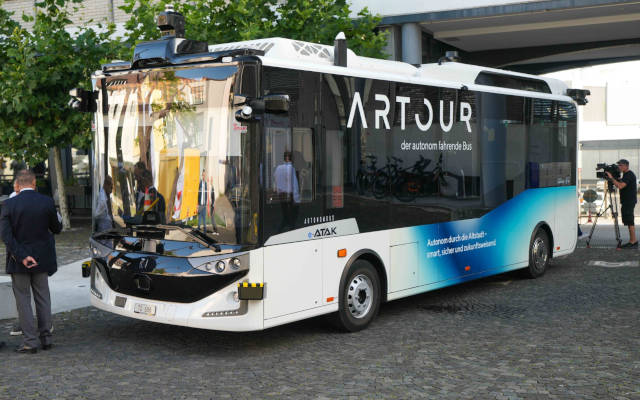 Arbon, Switzerland is launching ARTOUR, the country's first autonomous electric bus, in late 2025. The Karsan e-ATAK will run a 2.5 km route with nine stops, linking the historic center to Saurer Werk 2 housing. Operated by Eurobus Ostschweiz AG under the SCCL project, it aims to boost tourism and sustainable mobility. ARTOUR offers zero-emission travel and showcases Switzerland's push toward smart, eco-friendly public transport.
Arbon, Switzerland is launching ARTOUR, the country's first autonomous electric bus, in late 2025. The Karsan e-ATAK will run a 2.5 km route with nine stops, linking the historic center to Saurer Werk 2 housing. Operated by Eurobus Ostschweiz AG under the SCCL project, it aims to boost tourism and sustainable mobility. ARTOUR offers zero-emission travel and showcases Switzerland's push toward smart, eco-friendly public transport.Trio of Ex-Tesla Employees Start EV Charging Company in the UK After Elon Musk Fired Everyone
18 Aug 2025 | Synopsis
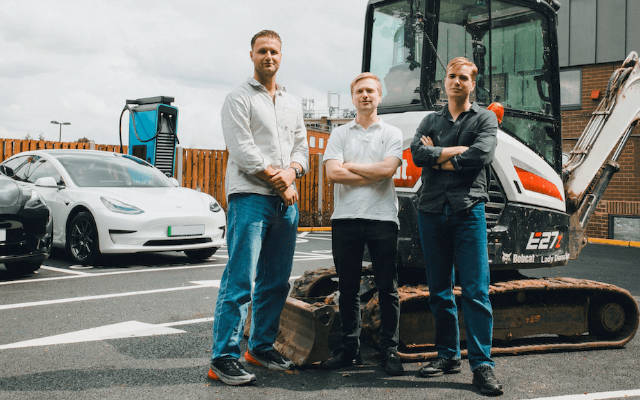 After Elon Musk abruptly fired Tesla's entire Supercharger team, three ex-employees launched Hubber, a UK-based EV charging startup focused on high-speed urban hubs for taxis and delivery fleets. Leveraging their experience deploying over 1,200 chargers, they aim to fill the urban fast-charging gap. Backed by £60M (~$81M), Hubber's first site opens August 20 in South London with 12 bays and up to 300kW chargers.
After Elon Musk abruptly fired Tesla's entire Supercharger team, three ex-employees launched Hubber, a UK-based EV charging startup focused on high-speed urban hubs for taxis and delivery fleets. Leveraging their experience deploying over 1,200 chargers, they aim to fill the urban fast-charging gap. Backed by £60M (~$81M), Hubber's first site opens August 20 in South London with 12 bays and up to 300kW chargers.Rivian's Also: A Billion-Dollar Bet on Small Electric Vehicles
18 Aug 2025 | Synopsis
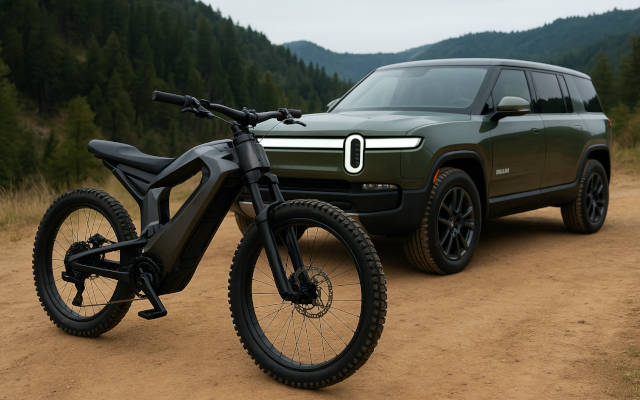 Rivian's spin-out, Also, is a billion-dollar bet on premium small-format EVs like e-bikes and scooters. Incubated as "Project Inder," it's now a standalone company backed by Greenoaks Capital. With design input from Jony Ive's LoveFrom and Rivian's tech, Also aims to bring connected, stylish micromobility to urban markets. Though no products are launched yet, its strategy blends Rivian's infrastructure with startup agility..."
Rivian's spin-out, Also, is a billion-dollar bet on premium small-format EVs like e-bikes and scooters. Incubated as "Project Inder," it's now a standalone company backed by Greenoaks Capital. With design input from Jony Ive's LoveFrom and Rivian's tech, Also aims to bring connected, stylish micromobility to urban markets. Though no products are launched yet, its strategy blends Rivian's infrastructure with startup agility..."Ben & Jerry’s Ditches ICE For Rivian’s Van
18 Aug 2025 | Synopsis
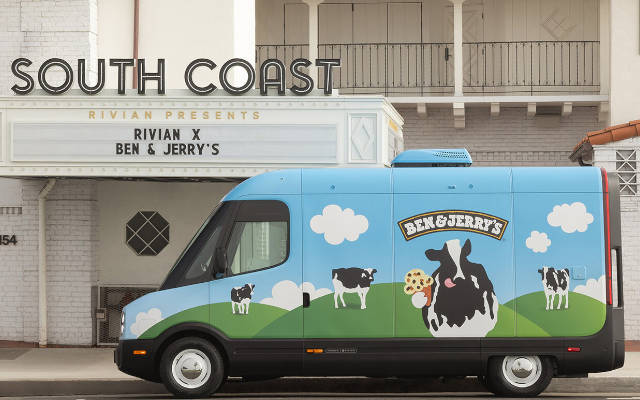 Rivian and Ben & Jerry’s have teamed up to create two all-electric "scoop trucks" built on Rivian's Commercial Van platform. Debuting at SXSW in Austin, the eco-friendly vehicles boast a 161-mile range and combine refrigeration and serving windows inside. After the launch, they'll travel nationwide...to bring scoops with less noise, emissions, and fossil-fuel reliance...showcasing Rivian's commercial EV versatility..."
Rivian and Ben & Jerry’s have teamed up to create two all-electric "scoop trucks" built on Rivian's Commercial Van platform. Debuting at SXSW in Austin, the eco-friendly vehicles boast a 161-mile range and combine refrigeration and serving windows inside. After the launch, they'll travel nationwide...to bring scoops with less noise, emissions, and fossil-fuel reliance...showcasing Rivian's commercial EV versatility..."
 EVWorld Exclusive
EVWorld Exclusive
EV Depreciation: A Temporary Dip, Not a Long-Term Trend
20 Oct 2025 |  EV depreciation concerns are real but overstated. Fleet failures and battery uncertainty skew resale data, yet modern EVs show strong longevity and lower operating costs. Automakers now offer battery health reports, extended warranties, and OTA updates to boost confidence. Policy support and LFP chemistry further stabilize value. As transparency improves, EVs will redefine long-term worth - not just match it.
EV depreciation concerns are real but overstated. Fleet failures and battery uncertainty skew resale data, yet modern EVs show strong longevity and lower operating costs. Automakers now offer battery health reports, extended warranties, and OTA updates to boost confidence. Policy support and LFP chemistry further stabilize value. As transparency improves, EVs will redefine long-term worth - not just match it.
Horse Powertrain: The Hybrid Trojan Horse
17 Oct 2025 |  Horse Powertrain, a joint venture by Renault, Geely, and Aramco, offers compact hybrid engines like the C1 to retrofit EV platforms. Designed as range extenders, these engines run on multiple fuels and meet Euro 7 standards. Though marketed as green tech, their real-world impact is debated - especially as studies show PHEVs are rarely charged. Horse may be a transitional solution, but 500-mile EVs are poised to dominate long-term.
Horse Powertrain, a joint venture by Renault, Geely, and Aramco, offers compact hybrid engines like the C1 to retrofit EV platforms. Designed as range extenders, these engines run on multiple fuels and meet Euro 7 standards. Though marketed as green tech, their real-world impact is debated - especially as studies show PHEVs are rarely charged. Horse may be a transitional solution, but 500-mile EVs are poised to dominate long-term.
Sticker Shock and Stagnant Pay: Why New Cars Are Slipping Out of Reach
17 Oct 2025 |  New car prices have outpaced wage growth, making ownership increasingly unaffordable. Even Ford's $30K EV pickup and other sub-$30K models may remain out of reach for many without incentives or financing reform. With monthly payments rising and federal credits phasing out, the affordability gap is reshaping the auto market. Shared mobility and micro-EVs may offer alternatives, but structural change is needed to restore access.
New car prices have outpaced wage growth, making ownership increasingly unaffordable. Even Ford's $30K EV pickup and other sub-$30K models may remain out of reach for many without incentives or financing reform. With monthly payments rising and federal credits phasing out, the affordability gap is reshaping the auto market. Shared mobility and micro-EVs may offer alternatives, but structural change is needed to restore access.
Toyota FT-Me: Shared Mobility Concept with Big Implications
17 Oct 2025 |  Toyota's FT-Me is a two-seat electric microcar designed for shared urban mobility, not just teens. Developed with UK government support, it features hand-only controls, solar panels, and a lightweight frame. Aimed at car clubs and last-mile use, it could offer affordable, accessible transport with low emissions. With steady utilization and supportive policy, FT-Me may become a viable, sustainable option in the UK's evolving mobility landscape.
Toyota's FT-Me is a two-seat electric microcar designed for shared urban mobility, not just teens. Developed with UK government support, it features hand-only controls, solar panels, and a lightweight frame. Aimed at car clubs and last-mile use, it could offer affordable, accessible transport with low emissions. With steady utilization and supportive policy, FT-Me may become a viable, sustainable option in the UK's evolving mobility landscape.
Creative Destruction vs. Fossil Retrenchment: Why Project 2025 Risks Leaving America Behind
16 Oct 2025 |  Project 2025 protects fossil fuel incumbents by dismantling Biden-era clean energy policies. Nobel economist Philippe Aghion argues that climate progress depends on creative destruction - letting green innovators outcompete legacy polluters. The U.S. risks falling behind as global markets embrace clean tech. Even its passport has slipped from the top 10. Innovation, not retrenchment, is the path forward
Project 2025 protects fossil fuel incumbents by dismantling Biden-era clean energy policies. Nobel economist Philippe Aghion argues that climate progress depends on creative destruction - letting green innovators outcompete legacy polluters. The U.S. risks falling behind as global markets embrace clean tech. Even its passport has slipped from the top 10. Innovation, not retrenchment, is the path forward
SEARCH RSSTREAM
 47 New Postings In Past 24 Hours
47 New Postings In Past 24 Hours
Category:mobility
Region:NoAmerica
Date:20 Oct 2025
Category:finance
Region:NoAmerica
Date:20 Oct 2025
Category:policy
Region:Global
Date:20 Oct 2025
Category:policy
Region:Global
Date:20 Oct 2025
Category:energy
Region:AsiaPacific
Date:20 Oct 2025
Category:mobility
Region:NoAmerica
Date:20 Oct 2025
Category:finance
Region:NoAmerica
Date:20 Oct 2025
Category:finance
Region:IndoAsia
Date:20 Oct 2025
Category:mobility
Region:AsiaPacific
Date:20 Oct 2025
Category:mobility
Region:MidEast
Date:20 Oct 2025
Category:mobility
Region:AsiaPacific
Date:20 Oct 2025
Category:mobility
Region:AsiaPacific
Date:20 Oct 2025
Category:mobility
Region:Europe
Date:20 Oct 2025
Category:mobility
Region:Europe
Date:20 Oct 2025
Category:mobility
Region:Africa
Date:20 Oct 2025
Category:mobility
Region:SoAmerica
Date:20 Oct 2025
Category:mobility
Region:Europe
Date:20 Oct 2025
Category:mobility
Region:NoAmerica
Date:20 Oct 2025
Category:mobility
Region:NoAmerica
Date:20 Oct 2025
Category:finance
Region:NoAmerica
Date:20 Oct 2025
